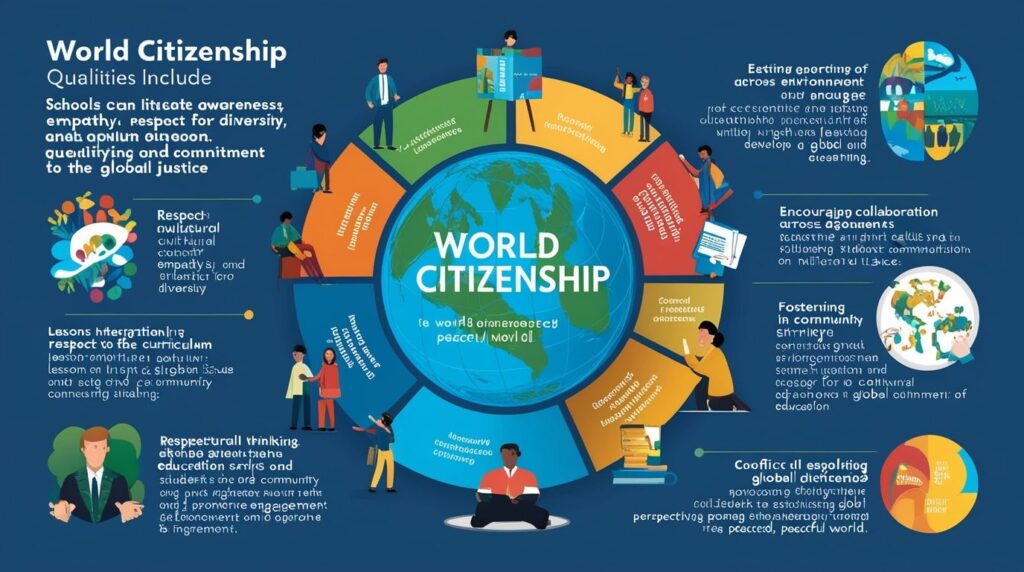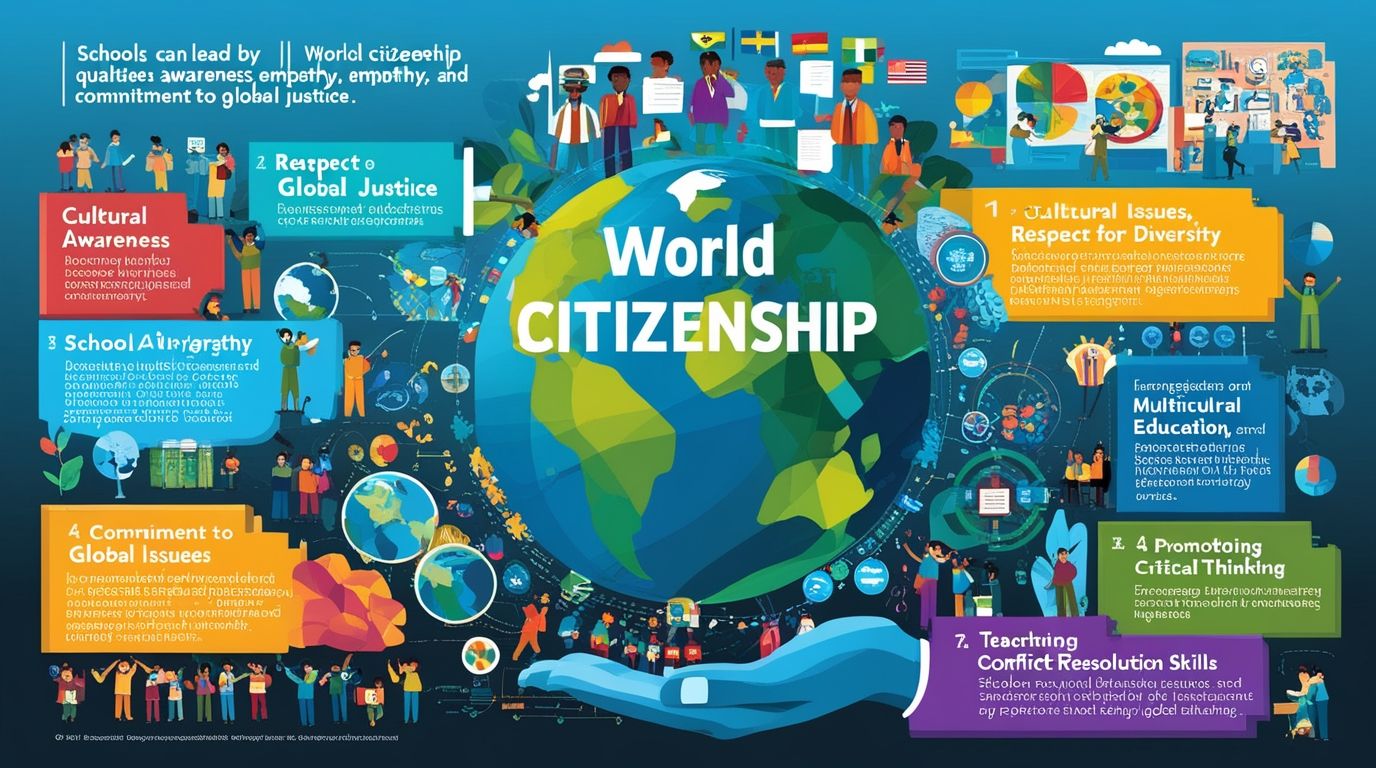Introduction
World Citizenship Qualities and How Schools Can Lead, In an increasingly interconnected world, fostering global citizenship is more important than ever. Schools, as primary institutions of learning and development, have a significant role in shaping future global citizens. The concept of world citizenship transcends national identities, encouraging individuals to think beyond borders and consider the broader human community. This article explores the key qualities of a world citizen and discusses how schools can nurture these traits in students, creating responsible, empathetic, and globally-minded individuals.
1. Global Awareness
Global awareness involves understanding international issues, cultures, and perspectives. World citizens are informed about the world beyond their immediate environment, aware of global challenges such as climate change, inequality, and human rights issues. Schools can encourage global awareness by incorporating international news, current events, and global studies into the curriculum. This could be done through:
- Global Curriculum: Schools should introduce topics like geography, history, and international relations to help students develop a broader understanding of world events and cultures.
- Intercultural Exchange Programs: Partnering with schools from different countries and encouraging student exchange programs will promote a deeper understanding of diverse cultures.
- Model United Nations (MUN): Participation in MUN programs helps students simulate global diplomatic processes and problem-solving on international issues.
By fostering curiosity about the world, schools can develop students’ ability to think globally while acting locally.
2. Empathy and Respect for Diversity
Empathy is at the core of world citizenship. It refers to the ability to understand and share the feelings of others, particularly those from different cultural backgrounds. Respect for diversity follows from this, as students learn to appreciate different viewpoints, traditions, and lifestyles.
To instill these values, schools can:
- Promote Diversity and Inclusion: Classrooms should reflect diverse perspectives, whether through the selection of literature from different parts of the world or through guest speakers from various cultural backgrounds.
- Encourage Collaborative Projects: Group work with students from different backgrounds can help students learn to respect and value different viewpoints.
- Conflict Resolution Training: Teaching students non-violent ways to resolve disputes and understand differing opinions can foster tolerance and mutual respect.
By cultivating empathy and respect, schools encourage students to connect with people of all nationalities, creating a foundation for peaceful coexistence.
3. Environmental Stewardship
A world citizen cares about the planet and takes action to preserve and protect it. Environmental stewardship is the responsibility of managing and caring for the environment through sustainable practices. Schools can help students become environmental stewards by educating them on the importance of sustainability and environmental conservation.
Ways schools can foster this quality include:
- Sustainability Education: Integrating environmental education into the curriculum, with topics ranging from climate change to renewable energy, biodiversity, and conservation.
- Green Initiatives: Encouraging students to participate in school-wide initiatives such as recycling programs, tree planting, and energy-saving campaigns.
- Outdoor Learning: Organizing field trips to national parks, wildlife reserves, or ecological sites to give students hands-on experience with nature and instill a sense of responsibility for the environment.
By instilling a sense of environmental stewardship, schools can teach students to take action locally to contribute to global environmental goals.

4. Critical Thinking and Problem-Solving
World citizens need to think critically about global issues, analyzing problems and finding creative, ethical solutions. Schools can play a crucial role in developing students’ critical thinking and problem-solving skills.
Some strategies include:
- Debate and Discussion: Encourage open discussions on controversial topics such as climate policy, human rights, and international conflicts. This can help students critically examine different perspectives.
- Project-Based Learning (PBL): Schools can implement PBL, where students work on real-world problems, such as finding ways to reduce carbon footprints or improve public health in underserved communities.
- Multidisciplinary Approaches: Students should be encouraged to view issues through various lenses—historical, scientific, and ethical—thus honing their ability to think critically and innovatively about global challenges.
Through the promotion of critical thinking, schools prepare students to face global challenges with informed and thoughtful solutions.
5. Active Participation and Civic Responsibility
A world citizen actively engages in civic life and contributes to their community, both locally and globally. Civic responsibility involves understanding one’s role in the community and the importance of contributing positively to society.
Schools can foster active participation through:
- Community Service Programs: Volunteering within the community helps students develop a sense of responsibility and connection to others. Schools can encourage participation in local or international service projects.
- Civic Education: Teaching students about the structure of government, their rights and responsibilities as citizens, and the importance of participating in democratic processes.
- Student-Led Initiatives: Schools can empower students by encouraging them to lead projects that address social or environmental issues, such as organizing a charity fundraiser or advocating for sustainable practices within the school.
By fostering civic responsibility, schools help students become engaged citizens who are willing to contribute positively to society.
6. Global Collaboration and Communication
In a globalized world, the ability to collaborate and communicate effectively with people from different countries and cultures is essential. Schools can prepare students for this through:
- Language Learning: Proficiency in multiple languages enhances communication and opens doors to understanding different cultures. Schools should offer foreign language programs that emphasize practical communication skills.
- Collaborative Technology: Utilize technology platforms that allow students to collaborate with peers from around the world on shared projects. Virtual exchange programs or online discussions can connect students with global peers.
- Group Projects with International Focus: Assigning collaborative projects that require research and communication with international organizations or students can foster skills in global teamwork.
Schools that promote collaboration and communication help students develop a global mindset, equipping them for future leadership roles in a connected world.
7. Ethical Leadership
World citizens are ethical leaders who guide others with integrity, respect, and a commitment to justice. They make decisions that positively affect the greater good and uphold human rights and dignity.
To nurture ethical leadership, schools can:
- Leadership Programs: Offer leadership training that emphasizes ethical decision-making, such as how to balance competing interests or handle moral dilemmas.
- Service-Learning Projects: Schools can encourage students to take leadership roles in community service projects, promoting a hands-on understanding of ethical leadership.
- Ethics in Education: Incorporate ethics into the curriculum by discussing historical leaders, moral philosophers, and contemporary ethical dilemmas such as data privacy and social justice.
By promoting ethical leadership, schools prepare students to navigate the complex ethical challenges of the global community.
8. Adaptability and Resilience
In a rapidly changing world, adaptability and resilience are crucial qualities for global citizens. Adaptability allows individuals to thrive in diverse environments and face challenges with confidence. Resilience helps them recover from setbacks and maintain a positive outlook in the face of adversity.
Schools can help develop these traits through:
- Growth Mindset Education: Teaching students that intelligence and abilities can be developed through hard work and perseverance, helping them view challenges as opportunities to learn.
- Extracurricular Activities: Participation in sports, arts, and clubs can help students build resilience by pushing them out of their comfort zones and encouraging perseverance.
- Mindfulness and Emotional Support Programs: Schools can implement programs that teach mindfulness, stress management, and emotional intelligence, helping students build inner resilience.
By fostering adaptability and resilience, schools prepare students to face an uncertain future with confidence and agility.
Conclusion
World citizenship is a multi-faceted concept that requires the development of various qualities, including global awareness, empathy, environmental stewardship, critical thinking, civic responsibility, communication, ethical leadership, adaptability, and resilience. Schools are uniquely positioned to nurture these qualities in students by creating a learning environment that encourages exploration, empathy, and engagement with the global community.
By integrating global citizenship into education, schools can prepare students to become responsible, informed, and active participants in an increasingly interconnected world. Through targeted programs and initiatives, schools can lead the way in developing the next generation of world citizens who are equipped to meet the challenges of the 21st century.
References:
- Banks, J. A. (2017). Diversity, citizenship education, and global citizenship: What are the connections?. Multicultural Education Review, 9(1), 1-12.
- Oxfam. (2015). Education for Global Citizenship: A Guide for Schools. Retrieved from Oxfam Global Citizenship Guide.
- Reysen, S., & Katzarska-Miller, I. (2013). A model of global citizenship: Antecedents and outcomes. International Journal of Psychology, 48(5), 858-870.
- UNESCO. (2014). Global Citizenship Education: Preparing Learners for the Challenges of the 21st Century. UNESCO Publishing.

6 thoughts on “World Citizenship Qualities”
Comments are closed.